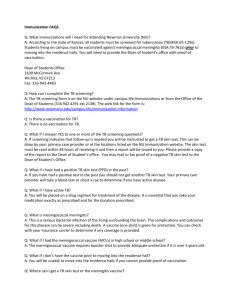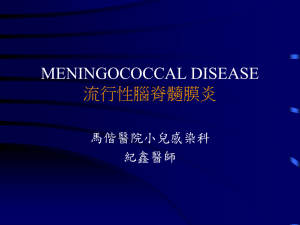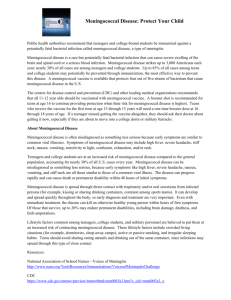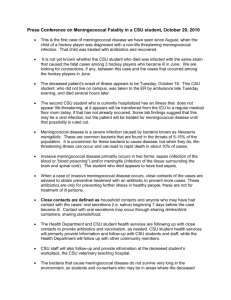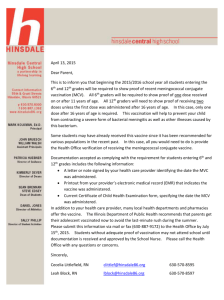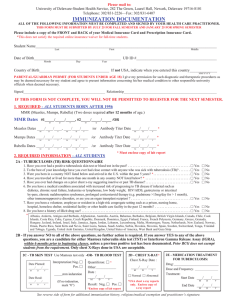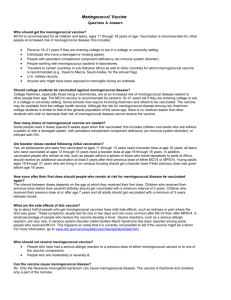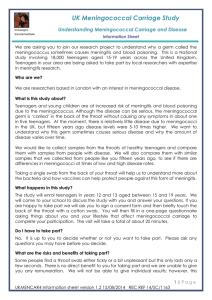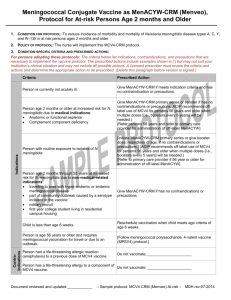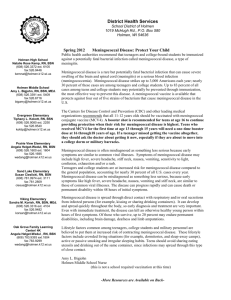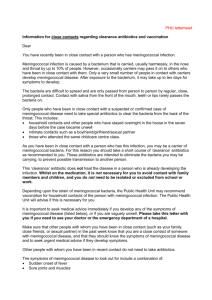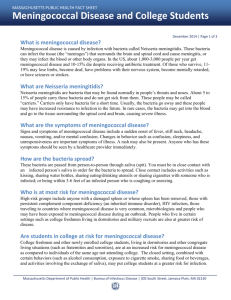meningitis_fact_sheet_and_sign_off_6
advertisement
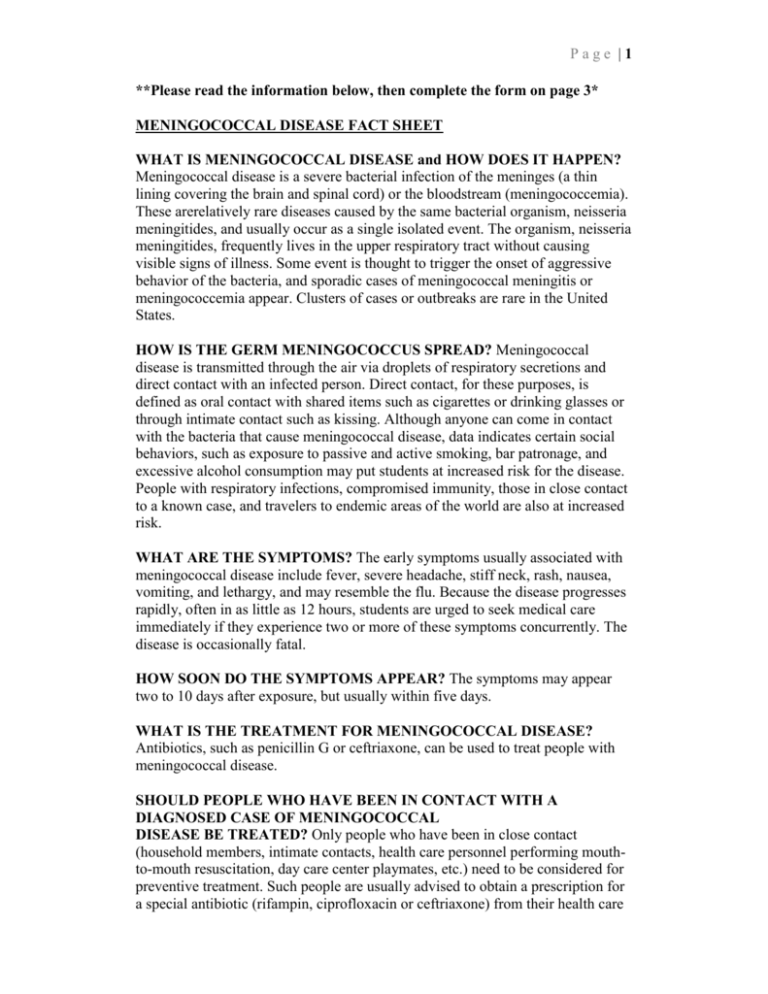
Page |1 **Please read the information below, then complete the form on page 3* MENINGOCOCCAL DISEASE FACT SHEET WHAT IS MENINGOCOCCAL DISEASE and HOW DOES IT HAPPEN? Meningococcal disease is a severe bacterial infection of the meninges (a thin lining covering the brain and spinal cord) or the bloodstream (meningococcemia). These arerelatively rare diseases caused by the same bacterial organism, neisseria meningitides, and usually occur as a single isolated event. The organism, neisseria meningitides, frequently lives in the upper respiratory tract without causing visible signs of illness. Some event is thought to trigger the onset of aggressive behavior of the bacteria, and sporadic cases of meningococcal meningitis or meningococcemia appear. Clusters of cases or outbreaks are rare in the United States. HOW IS THE GERM MENINGOCOCCUS SPREAD? Meningococcal disease is transmitted through the air via droplets of respiratory secretions and direct contact with an infected person. Direct contact, for these purposes, is defined as oral contact with shared items such as cigarettes or drinking glasses or through intimate contact such as kissing. Although anyone can come in contact with the bacteria that cause meningococcal disease, data indicates certain social behaviors, such as exposure to passive and active smoking, bar patronage, and excessive alcohol consumption may put students at increased risk for the disease. People with respiratory infections, compromised immunity, those in close contact to a known case, and travelers to endemic areas of the world are also at increased risk. WHAT ARE THE SYMPTOMS? The early symptoms usually associated with meningococcal disease include fever, severe headache, stiff neck, rash, nausea, vomiting, and lethargy, and may resemble the flu. Because the disease progresses rapidly, often in as little as 12 hours, students are urged to seek medical care immediately if they experience two or more of these symptoms concurrently. The disease is occasionally fatal. HOW SOON DO THE SYMPTOMS APPEAR? The symptoms may appear two to 10 days after exposure, but usually within five days. WHAT IS THE TREATMENT FOR MENINGOCOCCAL DISEASE? Antibiotics, such as penicillin G or ceftriaxone, can be used to treat people with meningococcal disease. SHOULD PEOPLE WHO HAVE BEEN IN CONTACT WITH A DIAGNOSED CASE OF MENINGOCOCCAL DISEASE BE TREATED? Only people who have been in close contact (household members, intimate contacts, health care personnel performing mouthto-mouth resuscitation, day care center playmates, etc.) need to be considered for preventive treatment. Such people are usually advised to obtain a prescription for a special antibiotic (rifampin, ciprofloxacin or ceftriaxone) from their health care Page |2 providers. Casual contact as might occur in a regular classroom, office or factory setting is not usually significant enough to cause concern. IS THERE A VACCINE TO PREVENT MENINGOCOCCAL DISEASE? Presently, there is vaccine that will protect against some of the strains of meningococcus. College students, such as freshman living in dormitories, have a modestly increased risk of meningococcal disease; students and parents need to be educated about meningococcal disease and the availability of safe and effective vaccine. The vaccine is also recommended in outbreak situations and for those traveling to areas of the world where high rates of the disease are known to occur. HOW EFFECTIVE IS THE VACCINE? The meningococcal vaccine has been shown to provide protection against the most common strains of the disease, including serogroups A, C, Y and W-135. The vaccine has been shown to be 85 to 100 percent effective in serogroups A and C in older children and adults. IS THE VACCINE SAFE? ARE THERE ADVERSE SIDE EFFECTS TO THE VACCINE? The vaccine is very safe and adverse reactions are mild and infrequent, consisting primarily of redness and pain at the site of injection lasting up to two days. WHAT IS THE DURATION OF PROTECTION? Menactra is effective for 10 years. Page |3 State University of New York at Oswego New York State Public Health Law requires that all college and university students be educated about Meningococcal Meningitis disease and what can be done to minimize your chances of catching this serious disease. Before signing below you should read the attached Meningitis Fact Sheet Please note that according to NYS Public Health Law, no institution shall permit any student to attend the institution without complying with this law. Check one box and sign below. I have: □ had the meningococcal meningitis immunization (Menomune™ or MenactaTM) within the past 10 years. □ read the information regarding meningococcal meningitis disease and decided I will NOT obtain immunization It is important to note that you may change your mind at a later time and receive MenactaTM or MenomuneTM vaccine. This vaccine may be obtained from your physician in your country. Student Name: Student’s Signature: ___________________________ ______________________________ Date: _______/_______/_______ Signature of Student or Parent/Guardian if student is under 18 years of age: ____________________________ Date: _______/_______/_______
